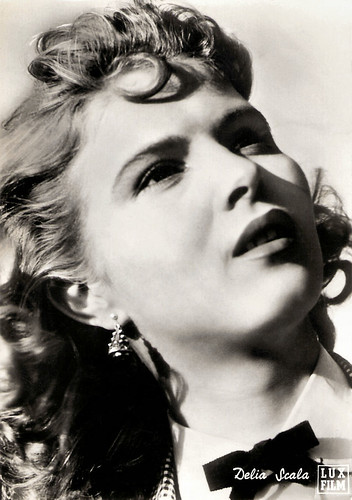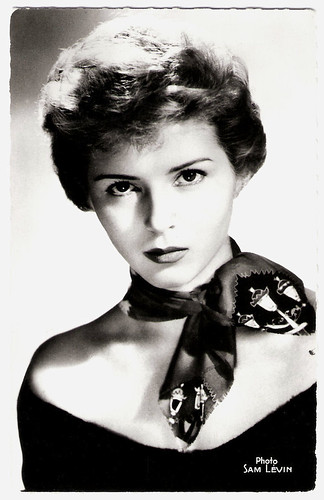
Italian postcard by Vetta Traldi, Milano, in the series Divi del cinema, no. 37.

Italian postcard, no. 303.
The first 'Commedia musicale'
Delia Scala was born as Odette Bedogni in Bracciano, Lazio, Italy in 1929. When she was a young girl, her family moved to Milan. When she was 8 years old, she entered at "La Scala" Ballet School and remained for 7 years, appearing in various ballets as 'La bottega fantastica' (La Boutique fantasque/The Magic Toyshop) with music by Gioacchino Rossini and 'La bella addormentata nel bosco' (Sleeping Beauty) with music by Pyotr Ilyich Tchaikovsky.
She performed in numerous ballets until World War II, after which she began appearing in motion pictures using the stage name, Delia Scala. Her early films include Anni difficili/Difficult Years (Luigi Zampa, 1948) in which she used her original name, and L'eroe della strada/The hero of the road (Carlo Borghesio 1948) with Erminio Macario, in which she was known as Lia Della Scala.
In the early 1950s, she appeared in Napoli milionaria/Side Street Story (Eduardo De Filippo 1950), the comedy Bellezze in bicicletta/Beauties on Bicycles (Carlo Campogalliani, 1951) also with Silvana Pampanini, the epic Messaline/Messalina (Carmine Gallone, 1951) starring Maria Felix, and the tragedy Roma ore 11/Rome 11:00 (Giuseppe De Santis 1952), one of the best examples of Neorealist filmmaking.
With her lively and nervy body, she appeared in a lot of films. In France, she played in the Film Noir Touchez pas au grisbi/Don't touch the loot (Jacques Becker, 1954) also with Jean Gabin and René Dary. Later in Italy, she appeared in the historical comedy Signori si nasce/Gentlemen Are Born (Mario Mattoli 1960) with Totò and Peppino De Filippo.
In 1954 Delia made her theatre debut with 'Giove in doppiopetto' (Double-breasted Jupiter). The show is considered the first 'Commedia musicale', an Italian musical genre created by playwrights Pietro Garinei and Sandro Giovannini with the collaboration of the musician and songwriter Gorni Kramer.
Scala later starred in 'Buonanotte Bettina' (Goodnight Bettina, 1956) with Walter Chiari, 'L'adorabile Giulio' (The Adorable Giulio, 1957) with Carlo Dapporto, 'Un trapezio per Lisistrata' (A Trapeze for Lisistrata, 1958) with Nino Manfredi, 'Delia Scala Show' (1960), 'My Fair Lady' (1964), and 'Il giorno della tartaruga' (The Day of the Turtle, 1965) with Renato Rascel.

Vintage postcard, no. 303. Photo: G.B. Poletto.
In 1956 Scala appeared in the TV show Lui e Lei/Him and Her (1956) with Nino Taranto. In 1959-1960 she co-hosted Canzonissima with Nino Manfredi and Paolo Panelli.

Italian postcard, no. 225.
Misfortune and tragedy
After twelve consecutive years of performances in Italy and Europe, Delia Scala began to experience fatigue. In 1965, at the height of her success (she had received offers from Broadway), she suddenly decided to drop out from live performances. In 1966 she married and temporarily retired to spend time with her family.
In 1968 Scala made a comeback with 'Delia Scala Story', a show written by Garinei and Giovannini. This was followed in 1970 by the very successful 'Signore e signora' (Mr. and Madame) with Lando Buzzanca. After a nine-year break, she starred in the show 'Che combinazione' (What a Coincidence) alongside Don Lurio.
From 1980 to 1983, Scala conceived and hosted the show 'Una rosa per la Vita' (A Rose for Life) to raise funds to support cancer prevention and research at the Bussoladomani arena in Lido di Camaiore, together with Raimondo Vianello and Sandra Mondaini. In 1982 Scala returned to television with the RAI fiction Casa Cecilia/Cecilia's Home (1982-1985). Her final TV role was in the sitcom Io e la mamma/Mum and I (1996-1998) aired on Canale 5.
Delia Scala achieved great professional success, but her personal life was marred by misfortune and tragedy. In 1946, at the age of 17, she married Nikiphorus Melitsanus, a Greek military officer who had come to Italy to join the partisan forces in the fight against the Nazi fascists. They separated two years later, and she got the marriage voided in 1956. She had a brief love affair with the famous actor/writer Eduardo De Filippo.
During the mid-1950s Scala was engaged with Formula One race car driver Eugenio Castellotti. He died in 1957 when his Ferrari crashed while attempting a speed record at the Modena race track. In 1967 she married Piero Giannotti. The marriage lasted until 1982 when Giannotti died of a heart attack while cycling along the beach in Viareggio. She married a third time in 1985 with industrialist Arturo Fremura. The marriage ended with her husband's death of liver cancer in 2001.
In 1974 Delia Scala was diagnosed with breast cancer and underwent a radical mastectomy. Although she appeared to have made a full recovery, she was struck again with the same illness in 2002. Scala died in 2004 in Livorno, Tuscany. She rests in the Cimitero della Misericordia in Livorno. At the time of her death, Italian President Carlo Azeglio Ciampi called her a "model of enthusiasm and rigorous professionalism" and said he rated her among "the most beloved and popular artists in the history of Italian entertainment".

Italian postcard by Bromofoto, Milano, no. 293. Photo: Lux Film.

French postcard by Editions du Globe, Paris, no. 310. Photo: Sam Lévin.
Source: Wikipedia (English and Italian) and IMDb.
No comments:
Post a Comment